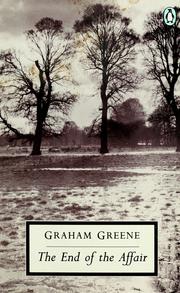Our book group choice for September 2013 is The End of the Affair by Graham Greene. The love affair between Maurice Bendix and Sarah, flourishing in the turbulent times of the London Blitz, ends when she suddenly and without explanation breaks it off.
The End of the Affair is a 1951 novel by Graham Greene, set in London during World War II. The story is narrated by Maurice Bendrix, a writer who has an affair with Sarah Miles, the wife of his friend Henry Miles. The affair ends abruptly when Sarah breaks off contact with Bendrix, leaving him heartbroken and obsessed.
Two years later, Bendrix hires a private investigator to follow Sarah. The investigator discovers that Sarah has been attending church and meeting with a cleric named Mr. Smythe. Bendrix is convinced that Sarah has found a new lover, and he becomes even more jealous.
One day, Bendrix breaks into Sarah’s house and steals her diary. He reads the diary and learns that Sarah had made a deal with God: if God would spare Bendrix’s life after a bombing raid, she would end her affair with him and return to her husband.
Bendrix is furious that Sarah would make such a deal, and he feels betrayed by her. He also feels guilty for the part he played in the affair, and he begins to question his own beliefs.
In the end, Bendrix comes to terms with Sarah’s decision. He realizes that she was not simply abandoning him for another man, but that she was trying to find her own way to God. He also realizes that he has been using his jealousy as a way to avoid dealing with his own pain and guilt.
The End of the Affair is a complex and moving novel about love, loss, and redemption. It is a story about the power of faith, and the ways in which we can use our relationships to either bring us closer to God or to push us away.
The End of the Affair Discussion Questions
- Did you find reading this book an enjoyable experience?
- Did you have any preconceptions about the book, the way it was likely to pan out?
- In Monica Ali’s introduction she argues not to get too wrapped up in the issue of catholocism but to think about fate and free will. Do you think that they are enough to explain Sarah’s actions?
- Did you find yourself thinking about endings? The end of the affair? The end of love? Why did Greene implicitly observe for the reader how the book’s narrative starts in the middle?
- It seems to be as much about the fear of belief as much as the fear of death. Is love an antidote/ distraction/ denial of death?
- Bendrix says he ‘hates’ Sarah. Can this be both shocking and understandable?
- When we learn Sarah is regularly away from home we think she may be visiting a doctor; but she is seeing Smythe. How does Bendrix’s perspective affect our interpretations of news about Sarah?
- By starting in the middle of the narrative we get all of Bendrix’s full-formed anger and loathing and misconceptions, do you find the structure confusing or well-designed?#
- What role does the War play in Greene’s narrative
- Is Henry good? Or niaive?
- Who is better: Henry? Bendrix? or Sarah?
- Death does not always mark the end of the problem for the living; how does Sarah continue to influence the other characters even after her death?
- Sarah is a liar but are there some promises she keeps?
- Would you recommend the book?
Individual Ratings
DKB's Rating 




Baljit's Rating 




EmmaJ's Rating 




EmmaT's Rating 




Catherine's Rating 




Miranda's Rating 





